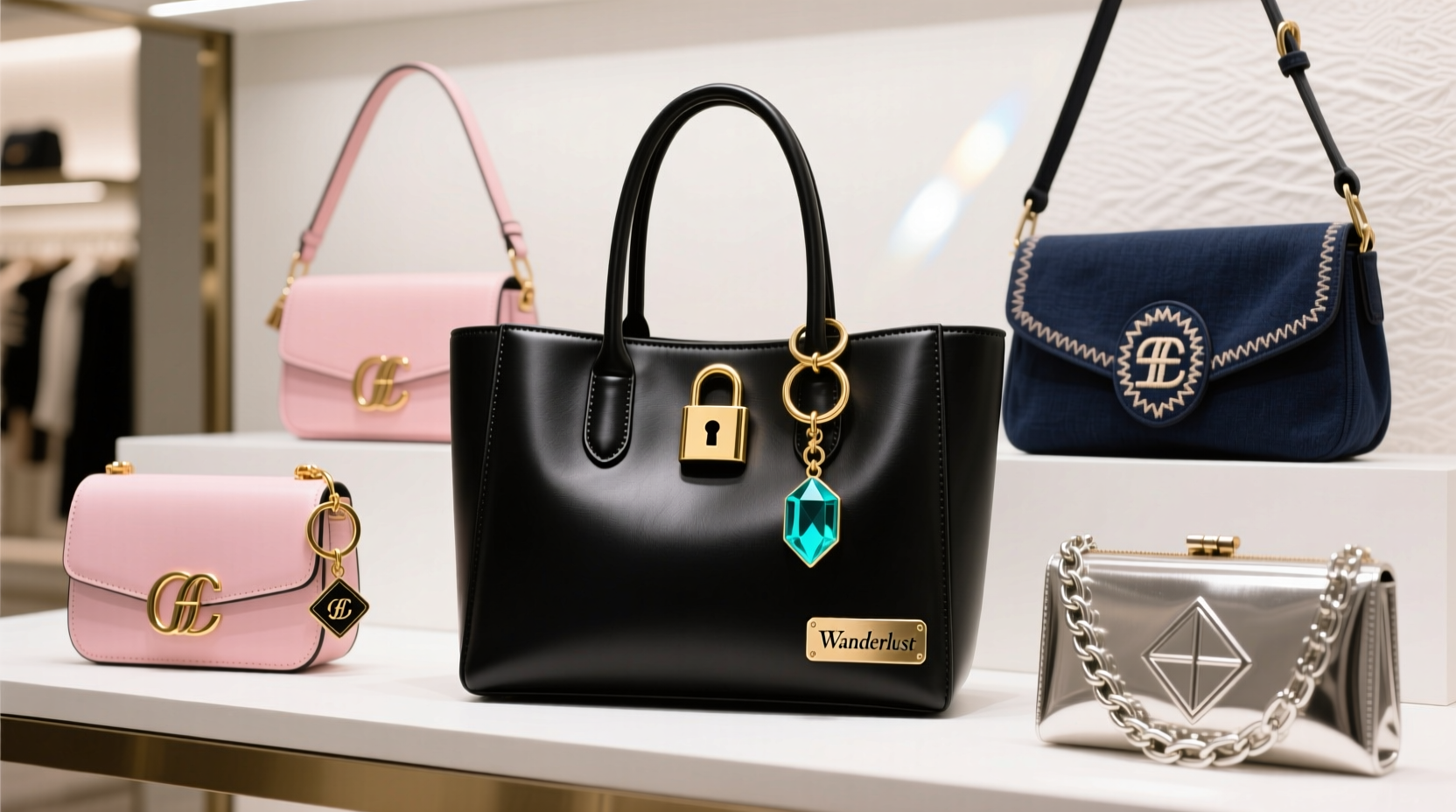In a world where personal expression defines fashion, the smallest details often make the boldest statements. Your handbag is more than just a functional accessory—it’s an extension of your personality, your mood, and your aesthetic. One of the most accessible and impactful ways to transform an ordinary bag into a personalized statement piece is through fashion keychains. From minimalist metal charms to bold enamel designs, these small accessories carry big style potential. When curated thoughtfully, they can reflect your identity, complement your outfit, or even serve as conversation starters.
The trend of accessorizing bags with keychains has evolved beyond mere utility. What began as a way to keep track of keys has transformed into a global fashion movement embraced by designers, influencers, and everyday style enthusiasts alike. Luxury brands now release seasonal keychain collections, while independent artisans craft one-of-a-kind pieces that celebrate individuality. Whether you're jazzing up a tote, crossbody, or backpack, the right keychain—or combination—can elevate your look from basic to bespoke.
Why Fashion Keychains Matter in Modern Style

Fashion keychains are not just decorative—they’re symbolic. They represent a shift toward customizable, modular fashion where consumers take ownership of their style narrative. Unlike fixed accessories, keychains offer flexibility. You can swap them out daily, seasonally, or based on your mood, allowing your bag to evolve with you.
Designers like Virgil Abloh at Off-White and Demna Gvasalia at Balenciaga have long championed the idea of \"accessorizing the accessory,\" turning mundane items into high-fashion icons. A simple leather strap with a dangling charm became a runway staple, proving that detail-oriented design resonates deeply with modern audiences.
“Personalization is the future of fashion. When people add something unique to a mass-produced item, they create emotional value.” — Lena Moreau, Fashion Psychologist & Trend Analyst
This emotional connection is exactly what makes keychains so powerful. A vintage locket passed down from a grandmother, a souvenir from a memorable trip, or a handmade clay charm from a friend—all tell stories without words.
How to Choose the Right Keychain for Your Bag
Selecting the perfect keychain isn’t just about aesthetics; it’s about harmony. The ideal piece should complement your bag’s material, color, hardware, and overall silhouette. Here’s how to get it right:
- Match the metal finish: If your bag has gold-tone zippers or studs, opt for gold-toned keychains. Silver, rose gold, and antique brass should align with existing hardware.
- Consider weight and size: Oversized charms may overwhelm a petite clutch, while tiny trinkets might disappear on a large tote. Aim for proportion.
- Think about texture: A plush teddy bear charm adds soft contrast to a sleek leather satchel, while a polished acrylic piece enhances a modern, minimalist design.
- Reflect your lifestyle: Frequent traveler? Try a globe or airplane charm. Book lover? A miniature library or typewriter could be perfect.
Step-by-Step Guide to Styling Multiple Keychains
Layering keychains is a growing trend, especially among Gen Z and millennial fashion communities. Done well, it creates visual interest and depth. Done poorly, it looks cluttered. Follow this five-step process to master the art of layered keychains:
- Start with a focal point: Choose one standout piece—a branded logo charm, sculptural pendant, or sentimental heirloom—as your centerpiece.
- Add complementary accents: Select 1–2 smaller charms that echo the theme or color palette. For example, pair a heart-shaped charm with tiny stars or arrows.
- Vary lengths and shapes: Use different chain lengths or attachment styles (e.g., lobster clasp vs. split ring) to create dimension.
- Limit the total count: Three to four keychains max for most bags. Overcrowding distracts from the bag’s design.
- Secure properly: Attach all pieces to a single D-ring or use a keychain organizer ring to prevent tangling and damage to stitching.
Mini Case Study: Maya’s Commuter Bag Transformation
Maya, a 28-year-old graphic designer in Brooklyn, owned a classic black nylon tote she used daily. While practical, she found it uninspiring. After visiting a local artisan market, she bought three small keychains: a brushed copper sunburst, a mini paint palette, and a clear resin charm with dried lavender inside. She attached them to her bag’s side zipper pull using a slim silver ring. The result? Her coworkers started complimenting her “artistic vibe,” and Maya felt more connected to her work persona. Within weeks, she had added seasonal swaps—pumpkin spice resin in fall, glitter snowflake in winter—making her bag a dynamic part of her self-expression.
Do’s and Don’ts of Bag Keychain Styling
| Do’s | Don’ts |
|---|---|
| Use non-abrasive materials to protect delicate bag surfaces | Attach heavy charms to flimsy straps or thin fabric |
| Choose hypoallergenic metals if sensitive to nickel | Let sharp edges scratch leather or suede |
| Remove keychains when storing bags long-term | Leave wet or dirty keychains on bags (can stain) |
| Align themes (e.g., travel, astrology, pets) | Mix too many competing colors or styles |
| Invest in quality hardware (clasps, rings) | Ignore signs of wear—replace frayed chains promptly |
Top 5 Keychain Trends for 2024
- Sustainable Materials: Cork, recycled glass, and biodegradable resins are gaining popularity among eco-conscious shoppers.
- Personalized Engraving: Initials, coordinates, or short mantras laser-engraved onto metal tags add intimacy.
- Micro-Statement Charms: Tiny but bold—think miniature protest signs (“Vote”), food motifs (avocado toast), or pop culture nods.
- Illuminated Keychains: LED-lit acrylic pieces or glow-in-the-dark resins for night-time visibility and fun.
- Modular Systems: Interchangeable panels or rotating discs allow users to change designs without buying new chains.
DIY Keychain Ideas for a Truly Unique Touch
For those who want complete originality, creating your own keychain is both rewarding and cost-effective. No advanced crafting skills required. Here’s a quick checklist to get started:
Diy Keychain Checklist
- Choose a base (metal ring, key fob, or leather loop)
- Select charms (resin, ceramic, metal, fabric)
- Gather tools: pliers, jump rings, glue (E6000 recommended)
- Assemble in a clean, well-lit space
- Test durability by gently tugging each component
Try embedding pressed flowers, fabric scraps from old clothes, or even tiny handwritten notes in resin for a deeply personal effect. Handmade keychains also make thoughtful gifts—attach one to a friend’s birthday bag with a charm that references an inside joke or shared memory.
FAQ
Can keychains damage my bag?
Potentially, yes—if they’re too heavy, abrasive, or improperly attached. Always ensure the charm’s weight is supported by a sturdy D-ring or reinforced loop. Avoid dragging chains across delicate finishes like patent leather or silk-blend fabrics.
Where should I attach keychains on my bag?
Common spots include D-rings, zipper pulls, front clasps, or belt loops on structured bags. Avoid attaching directly to stitching or fragile straps. Some bags come with dedicated charm attachments—use those when available.
Are luxury brand keychains worth the price?
It depends on your goals. If you value craftsmanship, authenticity, and resale potential, designer keychains (like Gucci’s GG Marmont hearts or Louis Vuitton’s seasonal releases) can be worthwhile investments. For everyday wear, independent designers often offer similar style at lower prices.
Final Thoughts: Make It Yours
Your bag doesn’t have to stay the way it came out of the store. In fact, it shouldn’t. Personalization breathes life into accessories, turning them from impersonal objects into meaningful extensions of self. Fashion keychains offer an effortless yet profound way to do just that. With a little creativity, attention to detail, and respect for balance, you can craft a look that’s unmistakably yours.









 浙公网安备
33010002000092号
浙公网安备
33010002000092号 浙B2-20120091-4
浙B2-20120091-4
Comments
No comments yet. Why don't you start the discussion?